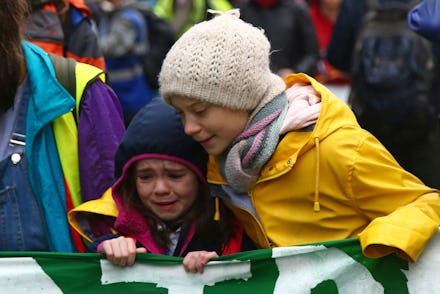Greta Thunberg demands world leaders bring that coronavirus energy to climate change

Greta Thunberg and other activists have sent an open letter to the EU demanding that the member states treat climate change like a pandemic-level crisis. The letter, published Thursday on Face the Climate Emergency, calls for the EU to treat the worsening climate with urgency by taking steps such as immediately ceasing business with the fossil fuel industry; creating climate change plans that protect workers and reduce economic, racial, and gender inequalities; and pushing to make 'ecocide' an international crime. The letter was also signed by other well-known individuals such as Nobel Peace Prize laureate Malala Yousafzai and Leonardo DiCaprio.
Despite the stumbles and unexpected resistance in the global response to the Covid-19 pandemic, the crisis has shown that governments and organizations can act quickly to address emergencies. The virus has proven that it's possible for leaders to suddenly limit movement, waive health testing fees, provide stimulus checks, switch to remote work, and increase social support.
But that quick action has also revealed something else: That our leaders never took climate change seriously enough, despite their words.
"It is now clearer than ever that the climate crisis has never once been treated as a crisis, neither from the politicians, media, business, nor finance," stated the letter. "We need to face the full picture. We are facing an existential crisis, and this is a crisis that we can not buy, build, or invest our way out of."
Although more than 175 countries joined the Paris Agreement, 60 of which promised to reach net zero emissions by 2050, activists have pointed out that not only does it seem like the world is behind on that goal, but that net zero by 2050 might not be enough.
"When you signed the Paris Agreement, the EU nations committed to leading the way," noted the letter. "The EU has the economic and political possibility to do so, therefore it is our moral responsibility. And now you need to actually deliver on your promises."
"We need to see it as, above all, an existential crisis," Thunberg told Reuters in a video interview. "And as long as it's not being treated as a crisis, we can have as many of these climate change negotiations and talks, conferences as possible. It won't change a thing."
What government leaders need to do is overhaul the existing economic system, the authors continued. A systematic change would be the only way to move toward a cleaner environment because the current system was never built to be altered.
"Our current system is not 'broken' — the system is doing exactly what it's supposed and designed to be doing," they wrote. "It can no longer be 'fixed.' We need a new system."
"So that means that if we are to stay below these targets, we have to make it possible to tear up and abandon valid contracts and deals. And that is not possible within today's system," Thunberg explained to Reuters. "So, yes, then obviously we need to think differently. And, yes, we need to think outside the box."
It's a sentiment that energy industry, environmental, and economic experts appear to agree with. Various research groups have sent in their own recommendations on how governments can use the momentary lull in economic and social activity to switch gears into a more sustainable and environmentally friendly system.
It's also interesting to note that the letter addresses both environmental justice and social justice; the authors believe that a fight for a green world is also a fight for the human world.
"The fight for justice and equity is universal," the letter stated. "Whether it is the fight for social, racial, climate or environmental justice; gender equality, democracy, human-, indigenous peoples'- LGBTQ- and animal rights; freedom of speech and press; or the fight for a balanced, well-being, functioning life supporting system."
It's not a matter of one thing being more important than another. Climate and racial injustice, for example, are two crises that come from a "lack of respect for each other and for the natural world," said Thunberg in her interview. Global society and leadership must address them all.
"If we don't have equality, we have nothing," according to the letter. "We don't have to choose, and divide ourselves over which crisis or issue we should prioritize, because it is all interconnected."